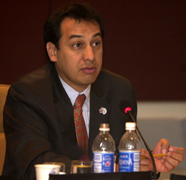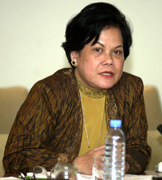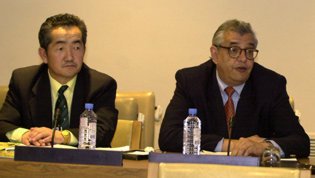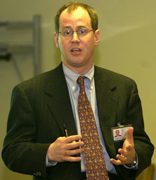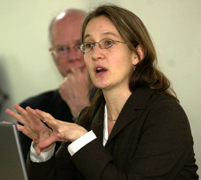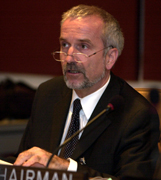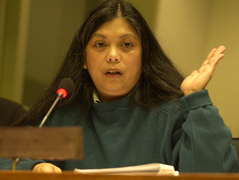|
|
|||||||||||||||||||||||||||||||||||||||||||||
|
|||||||||||||||||||||||||||||||||||||||||||||
|
Events convened on Monday, 1 April 2002 |
|
|
Promoting
health through sustainable development
Deron Lovaas, Natural Resources Defense Council, discussed the increase in urban sprawl in the US, which has resulted in increases in vehicle miles traveled and in emissions of carbon dioxide and air pollutants. He stressed the need for smart growth, which consists of development that makes more efficient use of land, including a greater mix of residential and commercial uses and higher density growth. He also emphasized the importance of protecting open spaces and revitalizing existing communities. José Manuel Galindo, North American Commission for Environmental Cooperation (CEC), presented a film on Mexico's experience with eliminating DDT while also decreasing the incidence of malaria, which was a result of cooperation between the ministries of health and environment. Mexico's efforts to achieve sustainable malaria control included the use of alternative vector control methods, epidemiological stratification, and focalized treatment on those thought to be infected.
Karen Hopfl-Harris,
on behalf of Rashid Chotani, Johns Hopkins School of Medicine and Public
Health, highlighted the adverse impacts of lead on human health. She noted
that many developing countries have not yet taken steps to phase out lead
in gasoline. She explained that a country's phase-out schedule depends on
the speed of refinery modifications, the need to reduce health risks due
to environmental pollution, the vehicle turnover rate and the need for
unleaded gasoline to protect catalytic converters. She stressed the
importance of public education and strong commitment by both governments
and NGOs for a successful phase-out.
|
|
Deepening and broadening participation in sustainable development Presented by the Earth Council
Erna Witoelar, Indonesian National Director for WSSD Prepcom IV, described the Indonesian National Council for Sustainable Development's (NCSD) experiences with creating a multisectoral process under conditions of political crisis. She stressed that political realities can support or ruin sustainable development, and underscored the need for an ethical framework such as the Earth Charter. Bernard Charrier, Green Cross International, reported on the first Earth Dialogues Forum, which addressed key issues to be raised at the WSSD from an ethical perspective. He said the Forum agreed on the need for ethical codes to guide sustainable development and welcomed the Earth Charter as a tool to support decision making for sustainable development at all levels.
Dairiijav Dagvadorj, Mongolian NCSD, attributed the Mongolian NCSD's notable success to its application of key strategies such as structural reorganization, creation of a multi-layered sustainable development network, and establishment of education programmes. Hiro Sakurai, Sokka Gakkai International, and Fayen d'Evie, Earth Council, introduced a film on raising public awareness of the WSSD, produced by the Earth Council in cooperation with UNDP and UNEP, which featured successful case studies on empowering people and changing mindsets for sustainable development.
|
|
Cleaning up the world's fuel supply: Subtracting sulfur from diesel Presented by the Natural Resources Defense Council (NRDC)
Bruce Bertelsen, Manufacturers of Emission Controls Association, stressed that achieving meaningful emission reductions requires a systems approach that includes advanced engine designs, advanced emission controls, and high-quality fuel. He explained how lead in gasoline prevents meaningful emission control in gasoline-powered vehicles, and how fuel sulfur negatively affects catalyst-based emission control technology. Highlighting fuel quality as a critical element in achieving emission reductions, he underscored the need to eliminate lead in gasoline and reduce to near-zero the level of sulfur in gasoline and diesel fuel. Michael Walsh, consultant, explained that fuels have an immediate impact on emissions and air quality and can enable or disable pollution control technology. He stated that reducing sulfur in gasoline and diesel lowers direct PM and SO2 emissions, allows the use of advanced diesel NOx and PM control technologies, improves the performance of advanced technologies, enhances retrofit opportunities, and can help reduce greenhouse gas emissions.
|
|
Water: Crisis or opportunities? Presented by UNESCO and Green Cross International
Marcia Macomber, Oregon State University, described her university's initiative and partnership on developing water conflict indicators and databases, which aim to enhance capacity and cooperation in shared freshwater basins worldwide. Léna Salamé, PCgCP: Water for Peace, presented the objectives of the PCgCP project, including defining and surveying conflicts, monitoring indicators of conflict and potential cooperation, developing educational materials, providing decision-making tools and disseminating results and best practices. She highlighted the project's innovative approach, which combines analysis and research with practical applications. Bertrand Charrier, Green Cross
International, described the Water for Peace framework, which focuses on
six locally managed transboundary river basin sub-projects. He underscored
the need for political commitment to address water management issues, and
highlighted an NGO initiative appealing for an international framework
convention for water.
|
|
Nuclear applications for sustainable development Presented by the International Atomic Energy Agency (IAEA)
Hans-Holger Rogner, IAEA, described IAEA's energy planning services for developing countries, underscoring the long life and ongoing impacts of energy decisions. He said all energy options are treated equally and neutrally throughout IAEA's planning process, which helps countries to assess advantages, disadvantages and costs of each option, uses computer models to incorporate these factors, and provides assistance in interpreting the results, with a focus on capacity building throughout the process. Rogner further addressed indicators for sustainable energy development, outlining social, economic and environmental factors in energy assessment. Discussion: Participants discussed, inter alia, the use of groundwater assessment techniques for arsenic detection, variability between countries in sustainability indicators, applications of the IAEA energy planning process for analysis of the Millennium Development Goals, and the safety of food and non-food irradiation techniques.
|
|
Integrating a human rights framework for sustainable development Presented by the People's Movement for Human Rights Education (PDHRE)
Felix Dodds, Stakeholder Forum for Our Common Future, underlined the need for citizens to exercise participation and governance rights in order to ensure the implementation of agreed environmental measures, and called for the integration of human rights language into the Johannesburg Declaration. Davinder Lamba, Mazingira Institute, underscored States' obligations to prevent violations of human rights arising from poverty. Joji Cariño, Tebtebba Foundation, discussed the human rights concerns of indigenous peoples with respect to sustainable development. She said the current focus on partnerships and trade-offs can end in domination by powerful groups unless empowerment of youth, women, major groups and others is successful. Minar Pimple, Youth for Unity and Voluntary Action, addressed linkages between environmental degradation and human rights, and noted that poor or nonexistent access to fuel, food and water results in deprivation of other human rights. Discussion: Participants discussed, inter alia: the relation between rights and responsibility; the human right to an environment adequate to health and well-being; strategies for bringing attention to human rights within the WSSD process; and respect for human rights as a conditionality in negotiations.
|
|
|
|
|
The Earth Negotiations Bulletin (ENB) on the Side is a special publication
of the International Institute for Sustainable Development (IISD) in
cooperation with the United Nations Development Programme (UNDP). The Editor
of ENB on the Side is Kira Schmidt
kira@iisd.org
|
|
|
|
| © 2002, IISD. All rights reserved. |
|


